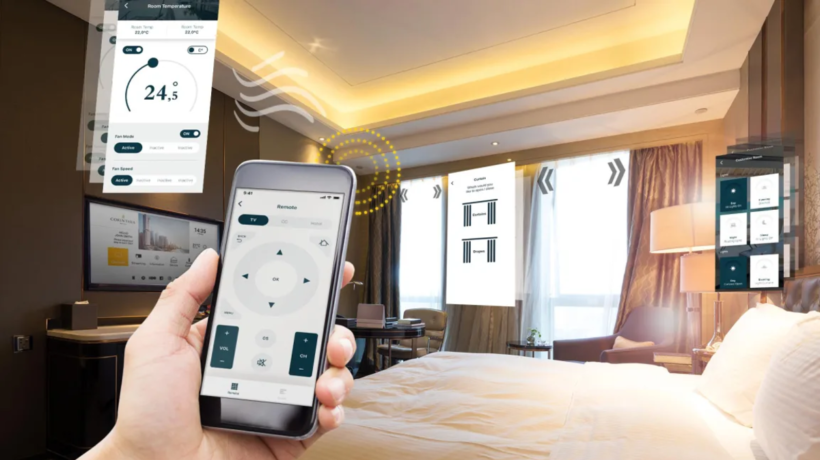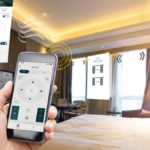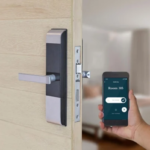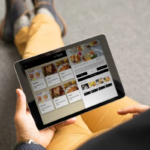It should come as a surprise to no one that hotels have suffered under Covid-19. With travel down, hotel occupancy has hit all-time lows, and hoteliers are trying to figure out how to coax visitors back inside as the pandemic rages on.
Their big vision for how to do this focuses on introducing contactless technology that can significantly reduce the number of surfaces you need to touch in the lobby and in your hotel room. These changes may make stir-crazy travelers feel better about staying in a hotel. But since Covid-19 mostly spreads through interaction with other people, contactless tech may not curb transmission unless it is accompanied by social distancing and hand washing.
What does a contactless hotel look like? You arrive in the foyer, but you’ve already checked into your room through the hotel’s mobile app, so you head to the elevators, bags in tow. Once you find your room, you tap a button in that same mobile app to unlock the door. That same app allows you to control the temperature, turn on the television, and order room service. Alternatively, the room may have been outfitted with Amazon Alexa. You call your commands into the room and Alexa does the rest.
Staying in a hotel may seem like a distant dream for most, but some global citizens are considering taking a vacation. Over the summer months, that may mean going on a camping trip or renting a cabin. While hotels may not be the first choice for travelers, hotel occupancy is slowly ticking upward. In early May, Marriott International said it had reached 20% occupancy in North American budget hotels, according to The Wall Street Journal. A month later, at a Goldman Sachs travel conference, CEO Arne Sorenson said that Marriott had surpassed 20% occupancy in North America.
To lure customers back, hoteliers have accelerated their investment in digital technology so visitors have to touch fewer surfaces such as door handles, keys, thermostats, television remotes, corded room phones, and even the curtains on the windows. They envision a future where travel requires little hands-on activity. Several major hotel chains, including Hilton and Virgin Hotels, were already investing in app-driven elements such as keyless entry to hotel rooms and digital check-in, but that trend is now going into overdrive as hotels switch up their operations to make guests feel more comfortable being out of their homes amid a pandemic.
“This has become even more accepted in the mind of hoteliers: that they’re going to have to do with much less physical interaction and much less contact,” says Martin Chevalley, CEO of InnSpire Global, a technology company that works with boutique hotel brands such as LVMH’s Cheval Blanc to create digitally enhanced travel experiences.
Making a hotel safe during a pandemic is an inherently difficult task, as the virus is more easily transmissible inside. In a June report, McKinsey encouraged the use of contactless technology and noted how Chinese hotels have introduced robots to deliver food, creating one less human interaction in its service. Hilton has sought out guidance from the Mayo Clinic on setting new standards for keeping its hotels clean and maintaining social distancing with guests. Many hotels are also embracing the deep clean, says Chevalley. Rooms are being cleaned more thoroughly between visitors, and hotel owners are making sure that clients are aware. One tactic is to leave little notes on toilets, remote controls, and side tables letting travelers know that the surface has been disinfected. Hotels are also allowing visitors to opt out of daily cleanings so they don’t have to worry about having another person come into their space and potentially contaminate it.
“The question is, to what extent will this change hospitality forever?” asks Chevalley.
While alleviating the need to touch things may make travelers feel better about taking a trip, a contactless world may not keep people from getting sick. In its guidance, the Centers for Disease Control and Prevention says that though it is possible for a person to get COVID-19 by “touching a surface or object that has the virus on it,” it is not the main way the virus spreads. The biggest risk for COVID-19, as scientists currently understand the disease, is through close personal interaction with other people.
Andrew Ibrahim, chief medical officer at design consulting firm HOK and surgeon at the University of Michigan hospital, says contactless technology works best as a means to augment other strategies that mitigate the risk of infection.
“What’s concerning to me is that if people assume it’s a substitute for hand washing and face masks and that all of a sudden if we have a touchless technology world then we won’t have any infection problems, and [they] throw out the tried-and-true boring stuff of hand washing and face masks,” he says.
Talking, laughing, and yelling in close proximity without a mask is how the virus makes its way to new hosts. Hotels doubling down on their cleaning may help prevent infection spread, but vacationers will also have to continue to wash hands regularly, wear masks, and stay socially distant.
As for long-term changes, hotel brands are likely to stick with whatever measures work best to keep their hotel rooms occupied, whether that’s contactless technology or just making sure that all visitors are wearing masks when they’re not in their rooms. But it is just as short-sighted to think that we will lose door handles to COVID-19 as it is to believe that people will permanently adopt the elbow bump as a means of saying hello.
“I think if [contactless technologies] are going to be lasting changes, they’re going to need additional benefits than just weathering COVID-19,” says Ibrahim. He gives the example of keyless entry and digital check-in, which hotels were already investing in as a way to make stays more convenient. These are the kinds of technologies that people may still want long after a COVID-19 vaccine is developed. By contrast, people may not want to open an app every time they want to adjust the blinds on their windows.
“A year from now, hopefully we have a vaccine and everyone gets it,” he says. “Are [hotels] going to be motivated to keep doing all these technologies in case another pandemic comes through? Unlikely.”










